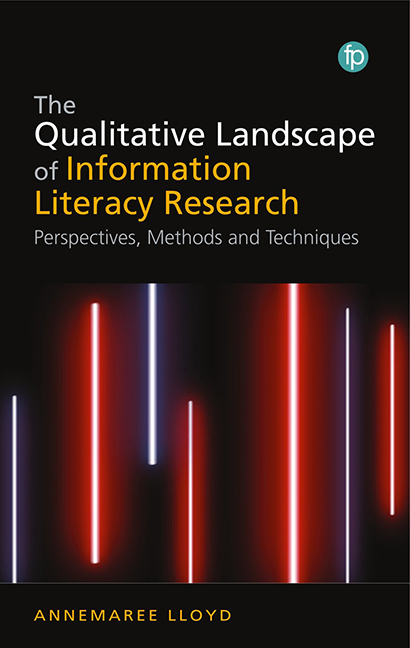Book contents
- Frontmatter
- Contents
- Figures
- Foreword
- Acknowledgements
- Introduction: The Qualitative Landscape of Information Literacy Research
- Chapter 1 Situating Information Literacy Research
- Chapter 2 Informing Information Literacy Research
- Chapter 3 Framing Information Literacy as an Educational Practice for Research. Learning Theories and Models
- Chapter 4 Qualitative Methods in Information Literacy Research
- Chapter 5 Collecting Data About Information Literacy: Data Collection Techniques
- Chapter 6 Planning for Research
- Chapter 7 Qualitatively Speaking and Doing Information Literacy Research
- References
- Index
Chapter 6 - Planning for Research
Published online by Cambridge University Press: 21 October 2021
- Frontmatter
- Contents
- Figures
- Foreword
- Acknowledgements
- Introduction: The Qualitative Landscape of Information Literacy Research
- Chapter 1 Situating Information Literacy Research
- Chapter 2 Informing Information Literacy Research
- Chapter 3 Framing Information Literacy as an Educational Practice for Research. Learning Theories and Models
- Chapter 4 Qualitative Methods in Information Literacy Research
- Chapter 5 Collecting Data About Information Literacy: Data Collection Techniques
- Chapter 6 Planning for Research
- Chapter 7 Qualitatively Speaking and Doing Information Literacy Research
- References
- Index
Summary
Introduction
Research into the practice and practising of information literacy has demonstrated that it is not simply operationalised as a text- or print-based practice. Being information literate and enacting the practice in ways appropriate to the context and its information environments requires that we are not only open to the range of information sources (social, corporeal, textual) but also the ways of knowing (through explicit or implicit dimensions) that help to form our information landscapes. This core idea should help to shape the way in which we enter the information literacy research field to collect and to analyse data, allowing us to become open and flexible to possibilities and approaches that enable us to work with widening forms and sources of information that contribute to our information experiences.
Whether you are researching information literacy for an academic project (a Masters, or PhD) or undertaking a practice-based project as part of your professional work, having a plan about how you are going to undertake this research and being aware of the ethics of your research is just good practice. Planning for any research project allows you to clarify your process by identifying what you want to find out; mapping out the questions you wish to ask; determining the method and techniques you intend to employ and the steps you will take to implement your plan.
Chapter 6 focuses on developing research plans, questions, design and sampling; the role of ethics and working with a range of participants; and data analysis. This chapter is intended to bring together the research elements described in previous chapters.
Designing qualitative information literacy research
Information literacy studies that employ a qualitative methodology frame research in terms of a problem statement and employ an inductive approach, where themes emerge from the data that has been collected and analysed. These highlight the lived experience of participants, which may in turn inform theory development (for researchers) or act as a catalyst for change to everyday activities for the practitioner. A qualitative approach to research does not use or test hypotheses; these are limited to a quantitative methodology.
It is useful to note, however, that the findings and theory that emerge from qualitative research may be used by quantitative researchers to generate a hypothesis for future research; or a hypothesis from a quantitative study may provide qualitative researchers with interesting questions which can then be studied in depth.
- Type
- Chapter
- Information
- The Qualitative Landscape of Information Literacy ResearchPerspectives, Methods and Techniques, pp. 97 - 118Publisher: FacetPrint publication year: 2021



